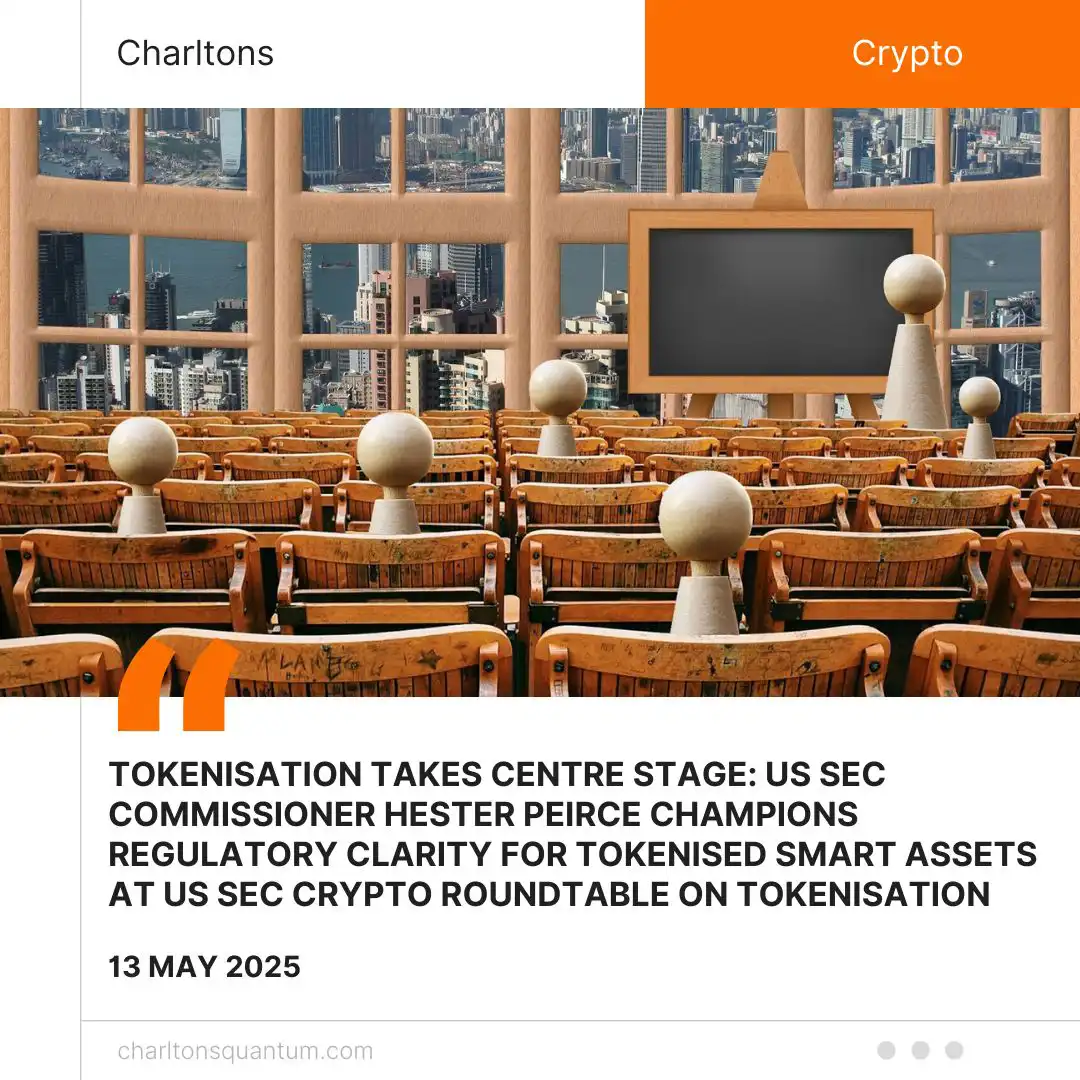
On 12 May 2025, the U.S. Securities and Exchange Commission (US SEC) hosted its fourth Crypto Task Force Roundtable in Washington, D.C., where Commissioner Hester M. Peirce delivered speech on the transformative potential of tokenisation. Her address, titled “Getting Smart – Tokenisation and the Creation of Networks for Smart Assets,” outlined the opportunities and regulatory challenges of integrating traditional financial assets into blockchain-based networks.
Commissioner Peirce’s discussed the revolutionary potential of tokenisation, which involves formatting traditional securities, such as stocks and bonds, as crypto assets on blockchain networks. She links tokenisation to the internet’s impact on communication, showing how crypto networks enhance the efficiency, accessibility, and functionality of financial assets through smart contracts. These self-executing programs automate processes like dividend payments and enable seamless integration with decentralised finance (DeFi) applications. Peirce stated that legal uncertainties, particularly around transfer agent rules, custody requirements, and the classification of tokenised securities, hinder tokenisation’s full potential. She advocates for treating tokenised securities similarly to traditional securities, absent compelling reasons to differentiate, and commits to working with stakeholders to resolve these issues sensibly.
The rise of blockchain technology has spurred interest in tokenisation, which allows traditional assets to be represented as digital tokens on distributed ledger networks. These networks, built on cryptographic protocols, enable faster settlement, increased liquidity, and novel use cases, such as using tokenised securities as collateral in derivatives transactions. Stablecoins, which maintain a stable value and operate on crypto networks, have demonstrated the scalability of tokenisation, prompting issuers to explore similar applications for securities like money market funds and private funds. However, the US SEC’s regulatory framework, designed for traditional securities markets, has struggled to accommodate these innovations. Past US SEC actions, such as the Special Purpose Broker-Dealer statement and proposed amendments to the Advisers Act custody rule, have created confusion for market participants seeking to issue, custody, or trade tokenised securities.
Commissioner Peirce articulated US SEC’s commitment to foster innovation in tokenisation while addressing regulatory ambiguities that impede progress. By drawing parallels between crypto networks and the internet’s transformative protocols, she seeks to reframe tokenisation as an evolution of financial markets rather than a departure from existing frameworks. Her address serves as a call to action for the US SEC to provide legal clarity, ensuring that tokenised securities can operate within the bounds of securities laws without unnecessary regulatory burdens. Peirce also emphasises collaboration with industry experts and the public to navigate complex legal challenges, signaling a shift from enforcement-driven regulation to proactive policymaking.
Peirce identifies several legal and regulatory hurdles that tokenisation faces within the US SEC’s jurisdiction such as uncertainty surrounding whether a crypto network can serve as the master security holder file under the United States Securities Exchange Act’s transfer agent rules, even when state laws permit such use. This ambiguity complicates the maintenance of ownership records for tokenised securities. US SEC’s Special Purpose Broker-Dealer statement has muddled the custody landscape by broadly defining “crypto asset security,” raising questions about whether broker-dealers can custody tokenised traditional securities without issuer or transfer agent oversight. Proposed amendments to the Advisers Act custody rule further complicate matters by potentially excluding securities on public, permissionless crypto networks from exceptions to the qualified custodian requirement. Other challenges include the integration of tokenised securities with DeFi applications, compliance with National Market System requirements, and determining whether tokenised securities are certificated or uncertificated.
To address these issues, with the principle of regulatory parity, whereby tokenised securities are treated similarly to their traditional counterparts unless a fact-based or legal rationale justifies differentiation. She suggests that crypto networks should be recognised as valid components of an issuer’s books maintained by transfer agents, aligning with state laws that contemplate such arrangements. Peirce also proposes revisiting the Special Purpose Broker-Dealer framework to clarify custody obligations and ensure broker-dealers can handle tokenised securities without undue restrictions. Regarding the Advisers Act, she supports allowing tokenised mutual fund shares and privately issued securities to qualify for custody rule exceptions, preserving their eligibility for standard exemptions and tackle broader challenges by leveraging the expertise of roundtable panelists and public stakeholders to develop sensible solutions, potentially through new guidance or rulemaking.
Peirce outlined how blockchain-based protocols and smart contracts serve not only as modern databases but also as new computing platforms that mobilise traditional securities into programmable, composable digital instruments. From automating dividend payouts to enabling securities to function as collateral or settlement tokens in onchain transactions, tokenised assets are poised to transform operational efficiency, transparency, and investor access.





